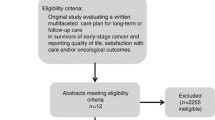Abstract
Purpose
In Georgia, there are more than 356,000 cancer survivors. Although many encounter challenges as a result of treatment, there is limited data on the availability of survivorship programming. This paper highlights findings from two surveys assessing survivorship care in Commission on Cancer (CoC)-accredited hospitals in Georgia.
Methods
In 2010, 38 CoC-accredited hospitals were approached to complete a 36-item survey exploring knowledge of national standards and use of survivorship care plans (SCPs), treatment summaries (TSs), and psychosocial assessment tools. In 2012, 37 CoC-accredited hospitals were asked to complete a similar 21-item survey.
Results
Seventy-nine percent (n = 30) of cancer centers completed the 2010 survey. Sixty percent (n = 18) reported having a cancer survivorship program in place or in development. Forty-three percent (n = 13) provided survivors with a SCP and 40 % (n = 12) a TS. Sixty percent (n = 18) reported either never or rarely using a psychosocial assessment tool. Sixty-two percent (n = 23) completed the 2012 survey. Ninety-six percent (n = 22) were aware of the new CoC guideline 3.3. Thirty-nine percent (n = 9) provided a SCP and/or TS. Eighty-seven percent (n = 20) stated they were very confident or somewhat confident their organization could implement a SCP and/or TS by 2015.
Conclusions
The data indicated the importance of collaboration and shared responsibility for survivorship care. Broad implementation of SCPs and TSs can help address the late and long-term effects of treatment.
Implications for Cancer Survivors
Increasing knowledge on survivorship care is imperative as the Georgia oncology community engages oncologists and primary care providers to achieve higher quality of life for all survivors.
Similar content being viewed by others
References
National Cancer Institute. Survivorship. In: NCI Dictionary of Cancer Terms, National Institutes of Health. 2014. http://www.cancer.gov/dictionary?cdrid=445089. Accessed 15 Jan 2014.
Siegel R, DeSantis C, Virgo K, et al. Cancer treatment and survivorship statistics, 2012. A Cancer Journal for Clinicians. 2012; 10.
Howlader N, Noone A, Krapcho M, Neyman N, Aminou R, Waldron W, et al. SEER Cancer Statistics Review, 1975–2009 (Vintage 2009 Populations). In SEER. National Cancer Institute. 2012. http://seer.cancer.gov/csr/1975_2009_pops09/. Accessed 21 Dec 2013.
Cancer Treatment & Survivorship Fact & Figures 2012–2013. American Cancer Society. 2012. http://www.cancer.org/acs/groups/content/@epidemiologysurveilance/documents/document/acspc-033876.pdf. Accessed 4 Dec 2013.
Institute of Medicine. From Cancer Patient to Cancer Survivor: Lost in Transition. 2005. http://www.iom.edu/Reports/2005/From-Cancer-Patient-to-Cancer-Survivor-Lost-in-Transition.aspx. Accessed 28 May 2014.
Ganz PA. Late effects of cancer and its treatment. Semin Oncol Nurs. 2001;17:241–8.
Rechis R, Beckjord E, Arvey S, et al. The Essential Elements of Survivorship Care: A LiveSTRONG Brief Report. The LiveSTRONG Foundation. 2012. https://assets-livestrong-org.s3.amazonaws.com/media/site_proxy/data/6f57b05726c2db3f56a85a5bd8f5dad166b80b92.pdf. Accessed 12 Nov 2014.
Hewitt M, Greenfield S, Stovall E. From Cancer Patient to Cancer Survivor: Lost in Transition. Institute of Medicine. 2005.
Stanton AL. What happens now? Psychosocial care for cancer survivors after medical treatment completion. J Clin Oncol. 2012;30:1215–20.
Salz T, Oeffinger KC, McCabe MS, et al. Survivorship care plans in research and practice. CA Cancer J Clin. 2012;62:101–17.
Stricker CT, Jacobs LA, Risendal B, et al. Survivorship care planning after the Institute of Medicine recommendations: how are we faring? J Cancer Survivorship. 2011;5:358–70.
Earle CC. Failing to plan is planning to fail: improving the quality of care with survivorship care plans. J Clin Oncol. 2006;24:5112–6.
Rechis R, Beckjord EB, Nutt S. Potential benefits of treatment summaries for survivors’ health and information needs: results from a LiveSTRONG survey. Journal of Oncology Practice. 2013.
Hewitt ME, Bamundo A, Day R, Harvey C. Perspectives on post-treatment cancer care: qualitative research with survivors, nurses and physicians. J Clin Oncol. 2007;25:2270–3.
Nekhlyudov L, Aziz NM, Lerro C, Virgo KS. Oncologists’ and primary care physicians’ awareness of late and long-term effects of chemotherapy: implications for care of the growing population of survivors. Journal of Oncology Practice. 2013.
Clinical Practice Guidelines in Oncology: Distress. National Comprehensive Cancer Network 2012. https://www.nccn.org/store/login/login.aspx?ReturnURL=http://www.nccn.org/professionals/physician_gls/pdf/distress.pdf. Accessed 2 June 2014.
McCabe MS, Bhatia A, Oeffinger KC, Reaman GH, Tyne C, Wollins DS, and Hudson MM. American Society of Clinical Oncology statement: achieving high quality cancer survivorship care. Journal of Clinical Oncology. 2013.
Commission on Cancer. Cancer Program Standards 2012: Ensuring Patient-Centered Care. American College of Surgeons. 2012. http://www.facs.org/cancer/coc/programstandards2012.pdf. Accessed 3 Dec 2013.
Clinical Practice Guidelines in Oncology: Survivorship. National Comprehensive Cancer Network. 2014. http://www.nccn.org/professionals/physician_gls/pdf/survivorship.pdf. Accessed 3 Dec 2013.
American Society of Clinical Oncology. Survivorship Guidelines. 2013. http://www.asco.org/guidelines/survivorship. Accessed 30 May 2014.
Hewitt M, Rowland JH. Mental health service use among adult cancer survivors: analyses of the national health interview survey. J Clin Oncol. 2002;20:4581–90.
Earle CC, Ganz PA. Cancer survivorship care: don’t let the perfect be the enemy of the good. J Clin Oncol. 2012;30:3764–8.
Rosales AR, Byrne D, Burnham C, Watts L, Clifford K, Zuckerman DS, et al. Comprehensive survivorship care with cost and revenue analysis. J Oncol Pract. 2013;10:81–5.
Willis A, Pratt-Chapman M, Reed E, and Hatcher E. Best Practices in Patient Navigation and Cancer Survivorship: Moving Toward Quality Patient-Centered Care. Journal of Oncology Navigation & Survivorship. 2014; 5.
Acknowledgments
This research would not have been possible without support from the Georgia Center for Oncology Research and Education, Georgia Cancer Control Consortium Steering Committee, and Survivorship Work Group. Thank you also to the Commission on Cancer-accredited cancer centers in Georgia for completing the 2010 and 2012 online surveys for this research.
Conflict of interest
The authors declare that they have no conflict of interest.
Author information
Authors and Affiliations
Corresponding author
Appendix
Appendix
Appendix A
2010 Survey Instrument














Appendix B
2012 Survey Instrument





Rights and permissions
About this article
Cite this article
Kirsch, L.J., Patterson, A. & Lipscomb, J. The state of cancer survivorship programming in Commission on Cancer-accredited hospitals in Georgia. J Cancer Surviv 9, 80–106 (2015). https://doi.org/10.1007/s11764-014-0391-1
Received:
Accepted:
Published:
Issue Date:
DOI: https://doi.org/10.1007/s11764-014-0391-1




